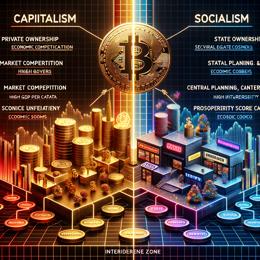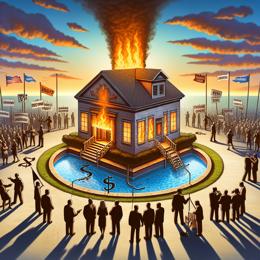Image created by AI
Rob Hersov Criticizes Leftist Ideology as Detrimental and Impractical
Rob Hersov, known for his forthright opinions, recently attacked leftist ideology, stating bluntly that it constitutes a mental disorder rather than a feasible political stance. Hersov’s critique didn't just skim the surface; it delved into economic, social, and psychological dimensions, making a compelling, if controversial, case against leftist policies.
Starting with socialist economics, Hersov pointed out the repeated failures of socialism as a system. He underscored the poverty and collapse seen in countries that have attempted pure socialism, mentioning Venezuela as a prime example. He contrasted these with nations like Singapore, Switzerland, and the United States, which thrive under capitalist systems and consistently rank high on the Heritage Foundation’s Economic Freedom Index.
Furthermore, Hersov brought attention to the significant reduction in extreme poverty globally over the past three decades, attributing this success to free-market capitalism which, according to him, has proven its efficacy as opposed to socialist policies which he argued hinder economic progress and innovation.
The narrative then shifted to the psychological impact of leftism. Citing studies from Pew Research and the CDC, Hersov claimed that leftists exhibit higher instances of mental health issues such as anxiety and depression compared to their conservative counterparts. He associated these findings with what he terms as the psychological instability inherent in radical leftist activism.
Hersov didn’t stop at economics and mental health; he also criticized the inconsistencies and, in his view, absurdities within radical feminist and gender discourse. Dismissing claims of widespread oppression in Western societies, he argued that leftist gender politics often distract from genuine gender equality issues elsewhere in the world.
His commentary extended to the strategic side of leftist ideology, proposing that the spread of what he considers extreme views benefits those in power by creating a populace that is more dependent, thus easier to control. He suggested that this is achieved by fostering a victim mentality among the youth, discouraging personal responsibility, and promoting government dependency.
Hersov ended his discourse with a stark dichotomy: reject leftist ideology and face reality or continue to subscribe to, what he sees as, destructive political fantasies. He called for those who share his views to remain vocal and unyielding in the fight for what he believes is the truth.
This controversial take by Hersov has ignited debates across political and social spectrums, reflecting the polarizing nature of contemporary political discourse.










